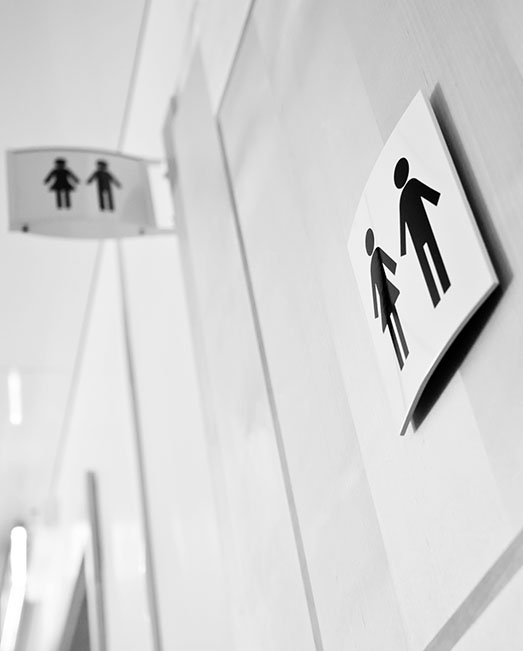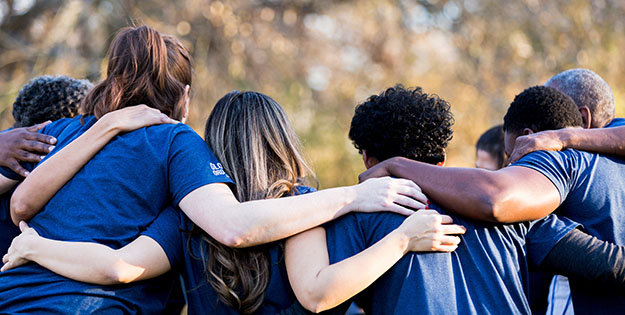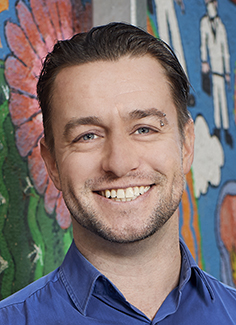Community
Copyright@ Australian Catholic University 1998-2026 | ABN 15 050 192 660 CRICOS registered provider: 00004G | PRV12008
Copyright@ Australian Catholic University 1998-2026 | ABN 15 050 192 660 CRICOS registered provider: 00004G | PRV12008

For hundreds of thousands of Australian students, school feels like a safe place. It’s where they spend most of their time, learning with the help of their teachers, building friendships with their peers, expressing themselves and figuring out who they are.
But there’s a cohort of students who are less likely to hold these feelings of comfort and security.
In an ACU-led study exploring perceptions of safety amongst students aged 11 to 18, those who didn’t identify as male or female were significantly more likely to feel unsafe at school, and tended to face more barriers when seeking help.
The comparative study, which drew on data from the ground-breaking Children’s Safety Survey, builds on overseas research showing that gender diverse students are more likely to miss class, have lower grades and view their school climate negatively.
The lead author Douglas Russell, a senior researcher at ACU’s Institute of Child Protection Studies (ICPS), says the findings suggest that youth-serving organisations could do more to foster an inclusive environment.
“There’s still a lot of heated debate around gender diversity in wider society,” says Russell, who conducted the study alongside ACU colleagues and researchers from Flinders and Western Sydney universities. “As a result, it may be that schools are struggling to provide an environment that feels safe for those who don’t conform to traditional gender expectations.”

Despite feeling unsafe at school and other youth spaces, gender diverse youth expressed greater confidence than other students that adults within those organisations – teachers, carers and administrative staff – would properly deal with harassment and sexually questionable behaviour if it arose.
Russell says the contrasting findings could be explained by the setting of one of the schools that took part; almost half the gender diverse students surveyed were from that school.
“[That school] may have gender and sexuality diversity-affirming educational content, including … support of gender and sexuality diverse students. This would have provided more confidence to this group that adults would try to help.”
This suggestion gels with international research on student perceptions, where teachers are consistently found to be key to feelings of safety in students with diverse gender identities.
“Students have told researchers at ICPS that these relationships are key to both feeling safe, and being safe, and so it’s important that teachers are able to work with children who are gender diverse, to support them and allow them to be the best they can be.”
So what leads to poor perceptions of safety in gender diverse students?
While the literature exploring this question is relatively scant, Russell and his co-authors contend that much of it comes down to a lack of understanding of gender diversity.
As a result, teachers and other adults might fail to intervene in discrimination. They might discount the views of young people on gender, or insist they engage in activities expected of their assigned gender. All of these things can produce a climate of fear.
“Perceptions of, fears about, and actual experiences of these types of barriers are likely to prevent many transgender and gender diverse young people from feeling safe, or seeking help when feeling unsafe,” the researchers say.
But is the onus on the school to overcome these barriers, or the teachers?
“In our minds, the safety of all young people – particularly safety from abuse and maltreatment – is everyone’s job,” says Russell, who has previously worked as a primary school teacher and a child behaviour therapist.
“There are institutions out there doing a lot of work to meet the National Principles [for Child Safe Organisations] … and whether you’re a school leader, a parent, a teacher or a volunteer in a youth-serving organisation, we all have a role to play to make all children and young people feel safe.”
While many organisations are striving to better equip their staff to support gender diversity, some opposition remains — even at the highest levels.
Debates over gender-neutral school uniforms or unisex bathrooms are almost always politically charged.
Russell says such initiatives can be small but meaningful ways for organisations to enhance feelings of safety in gender diverse students.
“I’ve been to universities and schools where some bathrooms are unisex, and I think there are little things like this that organisations can do to make an effort to be more inclusive,” he says.
Problems can occur in schools when students are routinely divided into groups based on a gender binary, he adds, and where gendered norms are incorporated into activities without a critical examination of underlying assumptions.
Research shows that strict adherence to the idea of two gender categories can affect mental wellbeing and academic achievement in those who don’t identify with those categories.
This often occurs amongst a backdrop of ‘cisgenderism’, which tends to silence conversations about the wide spectrum of gender identities. Professor Damien Riggs, a co-author in the study from Flinders University, says this ideology “delegitimises people’s own understandings of their bodies and genders, particularly for those whose gender identity does not match that assigned to them at birth”.
“This is about educating people, because gender diversity is a new thing for a lot of individuals and many schools … it’s not something that organisations had to think about 20, 30 or 40 years ago,” says Russell, adding that ICPS planned to develop resources to assist both Catholic and non-Catholic organisations in this task.
“As researchers at ACU, when you think about our mission as a university, we want to support the dignity of the human person and the common good, and through the knowledge we can pass on to school leaders and others in other youth-serving organisations, we can all act with kindness and love for all of the people we interact with.
“We need to accept people’s gender expression, to make young people who do identify as gender diverse feel safe and protected, and to ensure they have the same opportunities as their cisgender peers.”
Douglas Russell is a senior research officer at ACU’s Institute of Child Protection Studies, which aims to enhance outcomes for children, young people and families through quality research, program evaluation, training and community education, advocacy and policy development.

Copyright@ Australian Catholic University 1998-2026 | ABN 15 050 192 660 CRICOS registered provider: 00004G | PRV12008